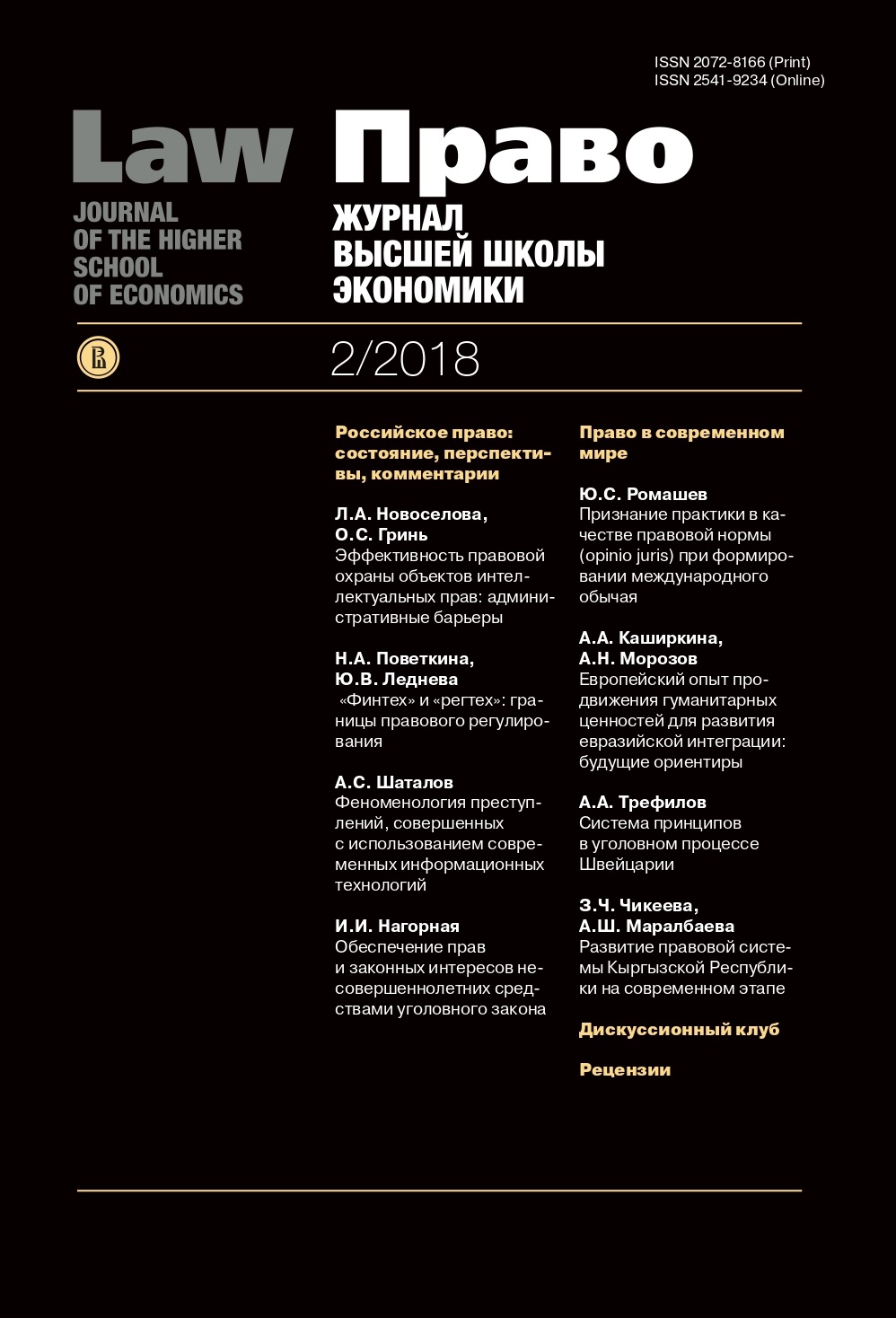Частные и публичные сервитуты в российском и зарубежном праве
Аннотация
Развитие имущественных отношений предполагает совершенствование правовой регламентации оборота недвижимости и форм землепользования. Исторически правовое регулирование сервитутов, разрешение споров и поиск баланса интересов собственника и сервитуария, с одной стороны, и накопление, обобщение и развитие понятий о специфике и месте сервитутов в системе ограниченных вещных прав, с другой, традиционно составляли наиболее дискуссионные вопросы вещного права в аспектах развития законодательства, правоприменения и доктрины. Регулирование сервитутов как вида ограниченных вещных прав показывает особенности становления и содержания национальной системы права. Восприятие сервитутов не только частным, но и публичным правом наблюдается как в российском, так и в зарубежном праве. В российской действительности исчезновение частной собственности на землю в условиях борьбы советского права с системой и принципами частного права повлекло за собой не только забвение данной подотрасли вещного права с ее основными институтами, но и отказ от правового регулирования разделения вещей на движимые и недвижимые. Соответственно, исследования сущности и определении места сервитутов в системе права надолго утратили актуальность. Необходимость в правовой регламентации сервитутов возникла на постсоветском пространстве в условиях развития рыночных отношений. Понятие «публичный сервитут» в современном российском законодательстве появилось в Указе Президента Российской Федерации «Об основных положениях государственной программы приватизации государственных и муниципальных предприятий после 1 июля 1994 г.». После вступления в силу Гражданского и Земельного кодексов появились основания говорить о легальном разграничении частных и публичных сервитутов. Современное состояние российского законодательства, незаконченность реформы гражданского законодательства в части модернизации положений о вещном праве, накопленные правоприменительной практикой подходы к разрешению споров о применении законодательства о сервитутах актуализируют не только вопросы совершенствования законодательных положений о сервитутах, но и ставят задачи для будущих научных исследований.
Литература
Bar C. (2015) Gemeineuropäisches Sachenrecht. Bd. 1. München: Beck. 859 p.
Bilimovich A.V. (1911) K voprosu ob uprazdnenii servitutov. [On Eliminating Servitudes]. Kiev: University, 63 p. (in Russian)
Goronovich I. (1883) Issledovanie o servitutakh [Study in Servitudes] Zhurnal grazhdanskogo i ugolovnogo prava, no 7-8, pp. 5-48.
Gusakov A. (1884) K voprosu o teorii servitutnogo prava [On the theory of servitude]. Zhurnalgrazhdanskogo i ugolovnogo prava, no 8, pp. 31-62.
Hausner G. (2003) Dientbarkeiten bei Zerstörung von Bausubstanz. München: Gerhard Johannes Hausner, 161 S.
Huber J.J. (1827) Abhandlung vom Recht der Dienstbarkeiten für praktische Rechtsgelehrte. Augsburg: Bäumer, 389 S.
Karapetov A.G. (2016) Ekonomicheskiy analiz prava [Economic analysis of law]. Moscow: Statut, 527 p.
Kostkiewicz J.K., Nobel P., Scwander I., Wolf S. (2011) Schweizerisches Zivilgesetzbuch. Kommentar. Zürich: Orellfüssli Verlag AG, 1926 S.
Koziol H., Bydlinski P., Bollenberger R. (2017) Kurzkommentar zum ABGB. Wien: Verlag Österreich, 254 S.
Malaurie P., Aynes L. (2007) Les biens. Paris: Defrénois, 397 p.
Möller C. (2010) Die Servituten. Entwicklungsgeschichte, Funktion und Struktur der grundstückvermittelten Privatrechtsverhältnisse im römischen Recht. Mit einem Ausblick auf die Rezeptionsgeschichte und das BGB. Göttingen: Wallstein Verlag, 446 p.
Schönemann O. (1866) Die Servituten. Eine Civilistische Abhandlung. Leipzig: Verlag von Johaun Ambrosius Barth, 195 p.
Tanguy Y. (1988) Servitudes en réseaux et propriété fluide, in la propriété, un droit inviolable et sacré. Paris: Presses universitaires de France, 202 p.
Trube C.M. (2001) Sicherungsdienstbarkeit und sichernde Dienstbarkeit. Frankfurt: Verlag von Peter Lang, 166 p.
Westermann H., Westermann H.P., Gursky K.H., Eickmann D. (2011) Sachenrecht. Heidelberg: C.F. Müller, 1079 p.
Copyright (c) 2018 Право. Журнал Высшей школы экономики

Это произведение доступно по лицензии Creative Commons «Attribution-ShareAlike» («Атрибуция — На тех же условиях») 4.0 Всемирная.


















